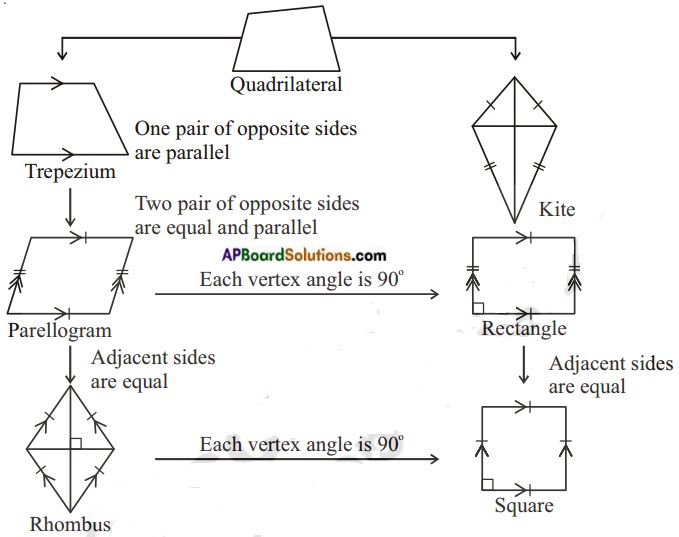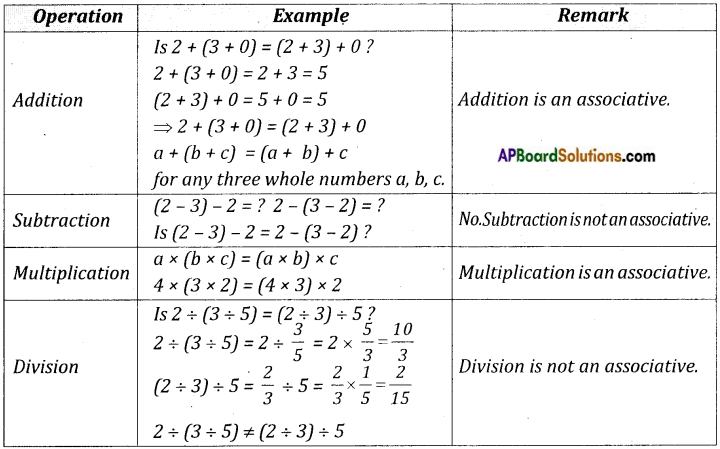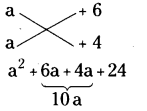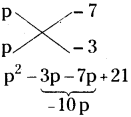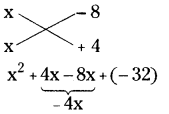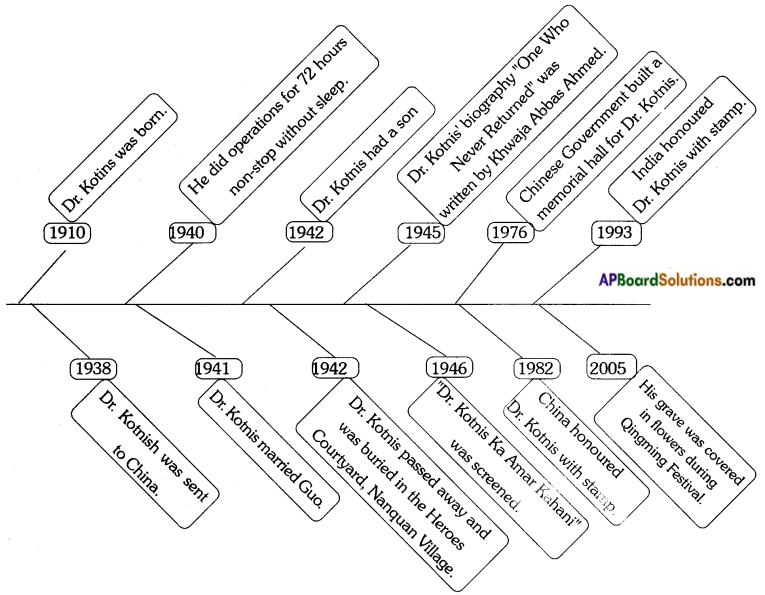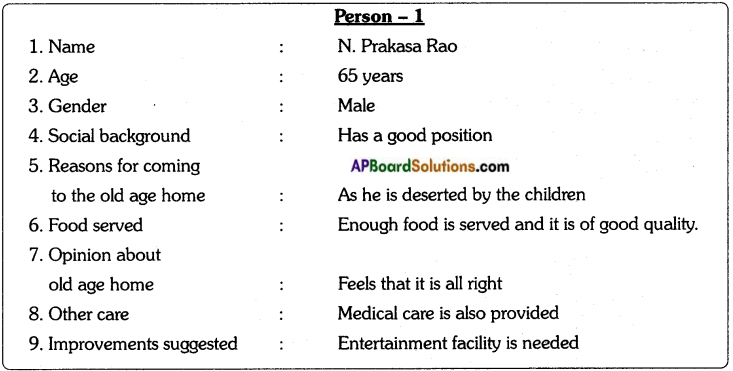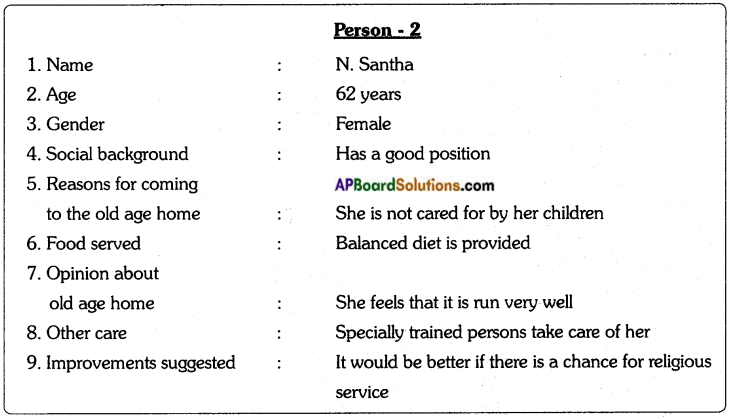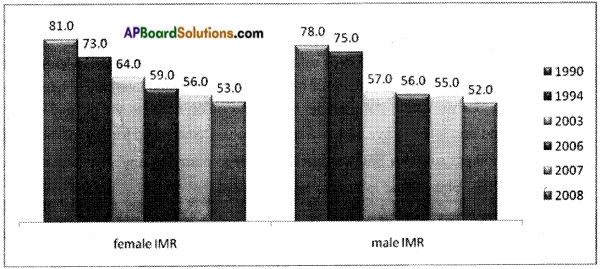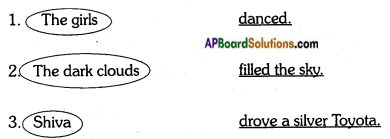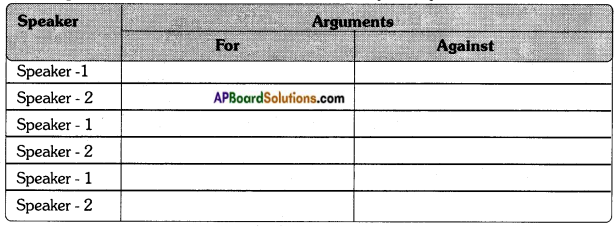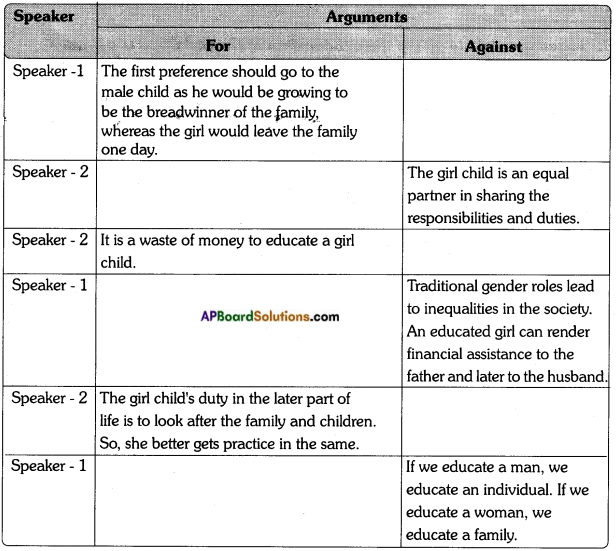AP State Syllabus AP Board 8th Class English Textbook Solutions Chapter 6A Dr. Dwarakanath Kotnis Textbook Questions and Answers.
AP State Syllabus 8th Class English Solutions Chapter 6A Dr. Dwarakanath Kotnis
8th Class English Chapter 6A Dr. Dwarakanath Kotnis Textbook Questions and Answers
Read the newspaper headline given below and answer the questions that follow.
International Nurses’ Day : President gives away Florence Nightingale Awards
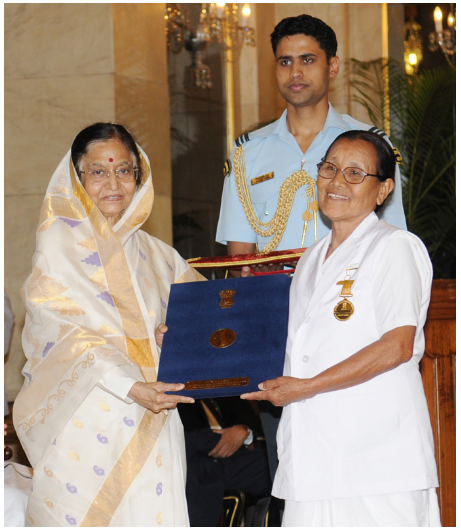
President Pratibha Patil giving away Florence Nightingale Award to S. Hoikholhing on 12th May 2012.
Question 1.
Why are the nurses given awards on the name of Florence Nightingale?
Answer:
Florence Nightingale Awards are annually given for excellence in nursing. The main aim of giving these awards to the nurses is to recognize professional nurses for their contributions to direct patient care.

Question 2.
Do you know the name of any Indian who may have rendered any significant services in another country and is still remembered and honoured by the people there?
Answer:
Yes, I know the name of an Indian who rendered his significant services in another country and is still remembered and honoured by the people there. He is none other than Dr. Dwarakanath Shantaram Kotnis. He was one of the five Indian physicians dispatched to China to provide medical assistance during the second Sino-Japanese War. No other Indians can claim the kind of adulation and respect Dr. Kotnis enjoys in China.
Comprehension
Answer the following questions.
Question 1.
Why was Dr. Kotnis sent to China?
Answer:
In 1937, the communist General Zhu De requested Jawaharlal Nehru to send Indian physicians to China during the Second Sino-Japanese War to help the soldiers. The President of the Indian National Congress, Netaji Subhash Chandra Bose accepted the request and made arrangements to send a team of volunteer doctors. A medical team of five doctors M. Atal, M.Cholkar, D. Kotnis, B.K. Basu and D. Mukeiji was sent as the part of Indian Medical Mission Team in September 1938. Thus Dr. Kotnis was sent to China to help the Chinese soldiers.
Question 2.
What was Dr. Kotnis’ contribution to the Dr. Bethune International Peace Hospital in China?
Answer:
Dr. Kotnis once served as Dr. Bethune International Peace Hospital’s doctor. He took over the post of the first President of the Bethune International Peace Hospital after Dr. Norman Bethune passed away. He worked as a lecturer earlier for sometime in the military area at the Dr. Bethune Hygiene School.

Question 3.
Why did Dr. Kotnis opt to stay back in China?
Answer:
After the Second Sino-Japanese War, all other doctors except Dr. Kotnis, returned to India. However, Dr. Kotnis decided to serve at the military base. So he opted to stay back in China.
Question 4.
How did the Chinese show their gratitude towards Dr. Kotnis?
Answer:
In order to cherish the memory of Dr. Kotnis, the Chinese government built a memorial hall for him in Shijiazhuang city, Hebei Province in 1976. Along with the Candian Dr. Norman Bethune, he continues to be revered by the Chinese people. In April 2005, both their graves were covered completely in flowers donated by the Chinese people during the Qingming Festival. A small museum there has a hand book which contains words that Kotnis wrote in his “Passage from India to China,” some of the instruments that the surgeon^ used at their time and many photogrpahs of doctors. China has honoured him with stamp in 1982.
Question 5.
Why was Mrs. Kotnis a regular invitee at the Indian Embassy functions in China?
Answer:
Mrs. Kotnis had been an honoured guest at many high-level diplomatic functions between China and India. She was a regular invitee at the Indian Embassy fuctions in China, because
the Chinese wanted to have good relationship with India. Not only that, to respect Dr. Kotnis’ selfless service to the Chinese, she was invited at the Indian Embassy functions in China.
Question 6.
What sort of person, do you think, was Dr. Kotnis? What are your impressions about him?
Answer:
Dr. Kotnis dedicated his entire life working as a battlefront doctor in China and rendered his selfless service to the injured Chinese soldiers during the Second Sino-Japanese War. Dr. Kotnis’ contribution towards humanity will be remembered forever. No single Indian has been more revered by ordinary Chinese than Dr. Kotnis. He was not only a hero but also a loved brother, husband and an adventurous young man.

II. Read the passage about Dr. Kotnis again and fill in the form given below.
1. Name:
2. Year of birth:
3. Place of birth:
4. Occupation:
5. Nationality:
6. Wife’s name:
7. Places of work and the positions held:
8. Honours given by China and India:
9. Date of death:
Answer:
1. Name Dwarakanath Kotnis
2. Year of birth 1910 (October 10,1910)
3. Place of birth Sholapur, Maharashtra
4. Occupation Doctor
5. Nationality Indian
6. Wife’s name Guo Qinglan
7. Places of work and the positions held:
(a) Yan’an → doctor
(b) Eighth Route Army General Hospital, North China → physician-in-charge
(c) Dr. Bethune Hygiene School → lecturer
(d) The Bethune International Peace Hospital → president
8. Honours given by China and India:
(a) The Chinese government built a memorial hall for him in Shijiazhuang city, Hebei Province in 1976.
(b) In April 2005, his grave was covered completely in flowers donated by the Chinese people during the Qingming Festival.
(c) A small museum there has a hand book which contains words that Kotnis wrote in his “Passage from India to China”.
(d) Both China and India honoured him with stamps in 1982 and 1993 respectively.
9. Date of death: 9th December, 1942.

Vocabulary
I. Here are some of the words that are related to the word ‘doctor’. In how many ways can you classify the following words?

| profession |
physician |
| specialization |
neurologist |
| qualification |
MBBS, MD |
| dress code |
white coat |
| medicines |
crocin |
| place of work |
clinic, Hospital |
| service |
treatment |
| tools |
syringe |
| related vehicle |
ambulance |
| target group |
patient |
Mapping these meanings through words is called semantic mapping. A set of words related in meaning are said to belong to the same semantic field.
e.g. : bus, driver, conductor, ticket, etc.
Write four words that belong to and that you can associate with the following words.
1. space (a) (b) (c) (d)
2. business (a) (b) (c) (d)
3. occupation (a) (b) (c) (d)
4. travel (a) (b) (c) (d)
Answer:
1. space (a) space-shuttle (b) space travel (c) space station (d) spaceship
2. business (a) selling (b) buying (c) exports (d) imports
3. occupation (a) teacher (b) driver (c) collector (d) conductor
4. travel (a) road (b) rail (c) sea travel (d) air travel
II. Read the sentence given below.
Dr. Kotnis lost his heart to a Chinese woman.
What does the expression ‘lose heart’ in the above sentence mean?
Lost his heart means fell in love.
Here is one more expression using the word heart.
‘Eat your heart out’. (Suffer from envy or jealousy)
e.g.: I am going to New York next week. Eat your heart out!
e.g.: When he hears about your promotion he will eat his heart out.

III. Match the following.
1. have a heart ( ) (a) sadness
2. broken heart ( ) (b) no feelings
3. heavy heart ( ) (c) a very deep thank you
4. take to heart ( ) (d) be merciful
5. a heart of stone ( ) (e) lost love
6. thanks from the bottom of my heart ( ) (f) take seriously
Answer:
ANSWERS
1 – d,
2 – e,
3 – a,
4 – f,
5 – b,
6 – c
Grammar
Coordination is a grammatical process by which two or more words phrases or clauses of the same rank are conjoined.
A conjunction that joins parts of a sentence (words, phrases or clauses) that are grammatically equal or similar in importance and structure is called a Coordinating Conjunction, e.g: and, but, or, nor, for, yet, so.
Coordinating Conjunctions: and, but, or, yet, so, neither… nor, either…. or, not only
but also, both, etc.
Subordinate Conjunctions: when, before, after, since, while, as, till, until, whenever, as long as, as soon as, no sooner….than, then, scarcely, hardly,…. when, wherever, because, in order that, so….that, if, though, even though, whereas, as if, whether …. or, etc.
Compound Sentence and Complex Sentence
Observe the following sentences.
1. Dr. Kotnis was a doctor and Guo, a nurse.
2. I could not stop laughing when he told jokes.
- What are the main clauses in each sentence?
- How many subordinate clauses are there in sentences 1 and 2?
Dr. Kotnis was a doctor and Guo, a nurse, (two main clauses)
I could not stop laughing when he told jokes, (one main clause and one subordinate clause) I could not stop laughing’ is a main clause, ‘when he told jokes’ is a subordinate clause.
- A sentence which consists of two or more main clauses combined with coordinate conjuctions is called a Compound Sentence.
- A sentence which consists of one main clause and one or more subordinate clauses combined with subordinate conjuctions is called a Complex Sentence.
Read the following sentences. Identify the clauses and say whether they are main clauses or subordinate clauses.
1. John suffers from Asthma but attends school regularly.
2. We like songs but they like games.
3. Japan attacked China in 1937 and wounded many soldiers.
4. If the rain stops, we will go out.
5. She was unhappy or she was upset.
6. The shops were closed because there was a strike.
Answer:
1. John suffers from Asthama but attends school regularly.
Main clause – John suffers from Asthama
Main clause – (he) attends school regularly.
2. We like songs but they like games.
Main clause – We like songs
Main clause – they like games.
3. Japan attacked China in 1937 and wounded many soldiers.
Main clause – Japan attacked China in 1937.
Main clause – (Japan) wounded many soldiers.
4. If the rain stops, we will go out.
Main clause – We will go out.
Subordinate clause – If the rain stops
5. She was unhappy or she was upset.
Main clause – She was unhappy
Main clause – She was upset.
6. The shops were closed because there was a strike.
Main clause – The shops were closed.
Subordinate clause – because there was a strike.

Writing
Developing Headlines.
When writing a news report for a newspaper, or your school News Board, the headline is the first and foremost impression you make on your reader. Therefore, writing a headline is a critical and creative art. „
Most of the people read only the headlines while reading a newspaper, to get the gist of the news.
- Headlines often contain a noun phrase with no verb.
- Headlines may have noun strings (several nouns put together).
- Various changes are made in the headlines.
- The simple tense form is used instead of the continuous or perfect form.
- The infinite form refers to the future.
- The auxiliary verb is dropped in the passive form.
- Articles are dropped; full-stops are not placed after headlines.
- Headlines may contain initials and abbreviations, e.g : Prime Minister’s advice
e.g : Man snatches woman’s chain
e.g : Andhra Pradesh State Board Examination Results Declared
e.g : Hyderabad celebrates kite festival
e.g : Chief Minister to inaugurate Craft Bazars
e.g : Passengers injured seriously in Nellore train accident
e.g : India to host SAARC meet in UP
I. Now write a headline for each of the following news reports. Remember to pick out only the main idea or words from the sentence.
(a) Hyderabad: With an alarming rise in cases of missing people, especially women and children, since 2009, the Andhra Pradesh Police have stepped up measures to trace them in co-ordination with various agencies and police forces.
Answer:
Andhra Pradesh police have stepped up measures to trace missing people
(b) The full moon that rises on this Friday night, August 31,2012, will be a Blue Moon. That’s what it has been dubbed as in modern folklore of the west. But will it actually be blue?
Answer:
A Blue Moon to rise on Friday night, August 31, 2012
(c) “If you look at the last three months, I am really practising well. ! am looking forward to playing my first game after a year.”
Answer:
I am to play my first game after a year

(d) Next time your cell phone runs out of battery, you can charge it by just holding it in your hands as the scientist claims to have developed a new technology that turns body heat into electricity.
Answer:
A new technology that runs body heat into electricity developed
II. Look at the picture where students are serving in an old age home.
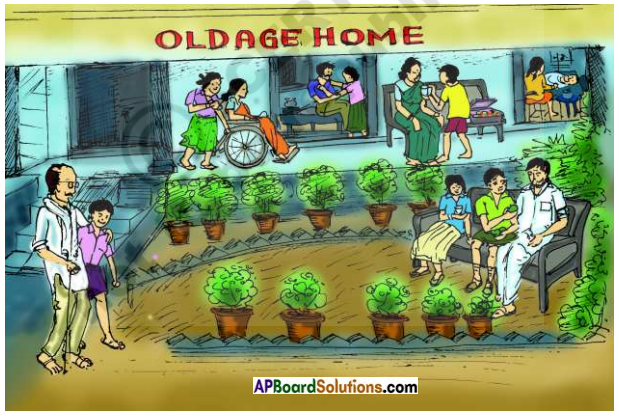
Discussion Points
- Do old people go to old age homes on their own or are they forced to go there?
- What are the conditions which make people leave their own homes and go to an old age home?
- In what way are the conditions at an old age home different from those at home?
- Are there any ways to prevent the old people from going to old age homes?
Note : Answers for the 4 discussion points given above are given in Q. III.
III. Now write an article based on the following hints.
- What are old age homes?
- Why do old people go there?
- Facilities at the old age homes
- Compare facilities at home and old age homes
Answer:
The old age homes are intended for senior citizens. Nowadays, most of the old people prefer to live in old age homes. Many factors have contributed to the alienation of the elders. Migration of young couples from the rural areas to the cities in search of better employment opportunities to fend for themselves. Youngsters are sometimes unfair to their parents. They don’t show the old ones any love or affection. Sometimes the old people are not given enough food to eat. The young people don’t provide proper medical facilities for the old people. The young people don’t care for them. Parents take a lot of pain to grow their children and sacrifice a plenty of their happiness: Our culture has it, that it is duty of the child to look after his parents. Unfortunately, it doesn’t happen in our present society. Everyone is in a mad race of earning money. And in the process they don’t take time off to look after their parents. We don’t find good relationships and human values in our present society. Aged parents are like children. They are sensible. Nowadays, India is intensely influenced by the western world where parents live alone or stay at old age homes. The old people don’t go to old age homes on their own. They are forced to go there.
In the old age homes trained staff can assist the old people. They can be kept clean and fed well. Proper medical care is provided. Old age homes have special medical facilities for senior citizens such as mobile health care systems, ambulances, nurses and provision of well-balanced meals. Apart from food, shelter and medical amenities, the entertainment and library facilities are also available for them. These homes create a family like atmosphere among the residents. Senior citizens experience a sense of security and friendship when they share their joys and sorrows with one another. Here, they live peacefully. Old age homes provide them the much needed comfort, solace and companionship. We can prevent the old people from going to old age homes by showing them love and affection. The youngsters should take care of them. They should provide proper medical facilities for them. They should allow their parents to move and talk freely in their homes.

Listening
Listen to your teacher. She/He will read out an announcement made by the headmaster of a Govt. High School.
An Announcement in a School
Dear students,
I am to inform you that we are going to start an ‘Enrolment Drive Programme’ next week. We will go to the nearby slums in our locality for 3 days and see if there are any children who are not studying in any school. There will be 10 teams each consisting of 6 students. I want all the students and teachers of classes VIII and IX to join this mission. Mr. Rajkumar and Ms. Christina will be joining us in our mission. They will help us in all the aspects related to the programme. Children, now those who volunteer to take the lead in teams should meet their class teachers after the lunch hour.
Now, answer the following questions.
1. What is the announcement about?
Answer:
The announcement is about launching of ’Enrolment Drive Programme.’
2. Who are the special guests joining their mission?
Answer:
Mr. Rajkumar and Ms. Christina are the special guests joining their mission.
3. What are the students asked to do in the programme?
Answer:
The students are asked to go to the nearby slums in their locality for 3 days and see if there are any children who are not studying in any school.
4. Why does the headmaster call it a mission?
Answer:
The headmaster calls it a mission as he thinks that the ‘Enrolment Drive Programme’ is a very important programme.
Oral Activity
If you get an opportunity to propose a ‘Vote of Thanks’ after completing the Enrolment Drive Programme. How would you do it?
Prepare ‘Vote of Thanks’ to thank Mr. Rajkumar, Ms. Christina, and all other participants.
Clues :
- Introduction of the programme
- About the participants and the service they offered during the programme.
- Their role in making the Programme a great success.
- Thanking each and everyone referring to their role in the programme.
- Requesting the extension of their service in future.
Answer:
Good evening to all of you. I am proud and lucky to have the opportunity of proposing a ‘Vote of Thanks’ to thank all the participants. As you are all aware that our ‘Enrolment Drive Programme’ has come to an end and it is a great success for all of us recognizing the students who are outside the school and joining them in the school. At first I would like to thank our special guests Mr. Rajkumar and Ms. Christina on behalf of our school and on my behalf for sparing some of their valuable time for us. We are very much thankful to you sir and madam for the service offered by you during the programme and your valuable suggestions. We are hopeful that we will get your extended cooperation and help in the future. Once again I wish to express our sincere thanks to you sir and madam for your role in making this programme a grand success. Now, I would like to thank each and everyone who participate in this programme and make it a grand success. I would like to request all of you to extend your priceless services
in the future.

Dr. Dwarakanath Kotnis Summary in English
Dr. Dwarakanath Kotnis was born in a lower middle class family on October 10, 1910 in Sholapur, Maharashtra. Coming from a family of doctors, Dr. Kotnis aspired to become a doctor.
After completing his graduation in medicine, he went on to pursue his post-graduation internship. He started his medical expedition in Vietnam, and then, moved on to Singapore and Brunei. The communist General Zhu De requested Jawaharlal Nehru in 1937 to send Indian physicians to China to help the war victims. Dr. Kotnis was one of the five doctors who were sent to China as the part of Indian Medical Mission Team. Though the other doctors returned to India after the war, Dr. Kotnis decided to stay back and serve at the military base. He started his work in Yan’an and then worked in the surgical department of the Eighth Route Army General Hospital as the physician-in-charge. He fell in love with a Chinese nurse, Guo Qinglan and married her in November, 1941. They had a son on August 23, 1942 and he was named Yin Hua. He worked as a lecturer for sometime at the Dr. Bethune Hygiene School. Later he took over the post of the first President of the Bethune International Peace Hospital. He did operations for 72 hours nonstop without any sleep during the long-drawn out battle against Japan. He played a major role in controlling a virulent strain of plague that hit Chinese soldiers. He died of epilepsy on December 9, 1942 at the age 32, and was buried in the Heroes Courtyard, Nanquan Village.
The Chinese government built a memorial hall for him in Shijiazhuang city, Hebei Province in 1976. His grave was covered completely in flowers donated by the Chinese people during the Qingming festival. Both China and India honoured him with stamps in 1982 and 1983 respectively. Later, Kotnis, family visited Kotnis’ grave and Dr. Bethune International Peace Hospital.
After Dr. Kotnis’ death, their son Yin Hua also passed away when he was just 25. Despite the two premature deaths, Mrs. Kotnis maintained her links with the Kotnis family. Mrs. Kotnis had been an honoured guest at many high-level diplomatic functions between China and India. She was a regular invitee at the Indian Embassy functions in China. Dr. Kotnis become famous in his hometown with the publication of “One Who Never Returned” written by Khwaja Abbas Ahmed and the screening of the movie “Dr. Kotnis Ki Amar Kahani,” directed by V. Shantaram. No other Indians can claim the kind of adulation and respect Dr. Dwarakanath Kotnis enjoys in China. Dr. Kotnis’ contribution towards humanity will be remembered for ever.

Dr. Dwarakanath Kotnis Glossary
adulation (n): admiration; praise
virulent (adj): dangerous
shy away (phr.v): avoid something that you dislike
epilepsy (n): a disease of the nervous system that causes a person to fall unconscious
revered (v): respected or admired deeply
commemorate (v): keep a great person, event etc. in people’s memories
vivacious (adj): cheerful
venerated (v): respected
septuagenarian (n): a person who crossed 70 years
memorabilia (n): objects that are collected in memory of persons and events
render (v): to give somebody something
vivacious (adj): having a lively, attractive personality
pursue (v): to try to achieve something over a period of time
internship (n): a job that an advanced student of medicine, whose training is nearly finished, does in a hospital to get further practical experience
put aside (phr.v): to ignore or forget something, usually a feeling or difference of opinion.
expedition (n) : an organized journey with a particular purpose
lose heart (idiom): to fall in love with somebody
passed away (phr.v): died

fortnight (n): two weeks
soulmate (n): an intimate associate or companion ; someone with whom you have a special relationship and whom you know and love very much
cherish (v): to love somebody/something very much and want to protect them or it
![]()
![]()
